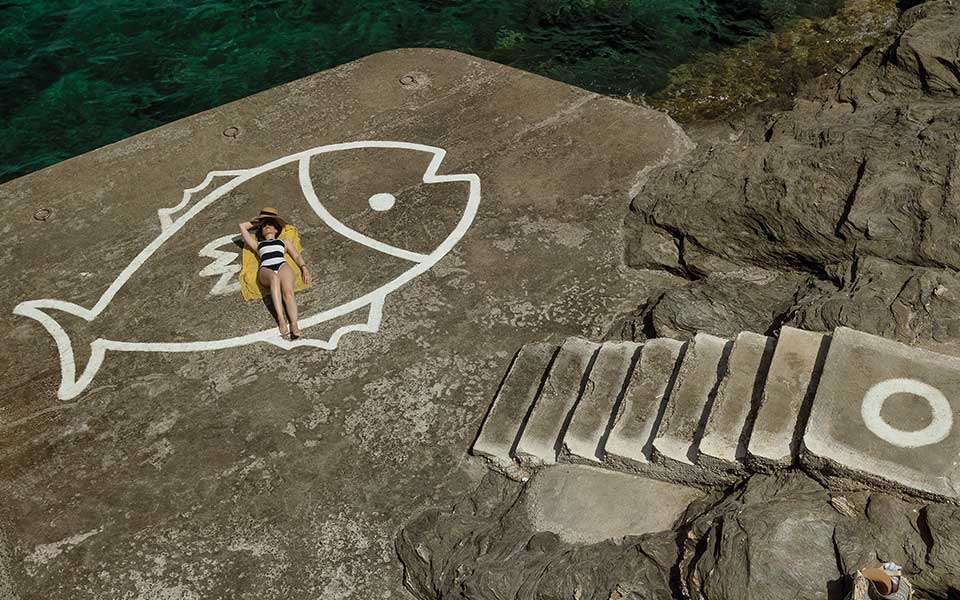July 1987 on the island of Andros was rich with events. Ten oil paintings, 12 sketches and 20 etchings by Pablo Picasso, 155 photographs by Henri Cartier-Bresson, and 80 sketches and watercolors by the Czech artist Frank Kupka had found their place on the walls of the Museum of Contemporary Art in the island’s capital, Chora. In the courtyard of the Archaeological Museum, sculptures by seven young Greek artists awaited visitors to the island.
On Saturday, July 4, the appearance of the writer Nikiforos Vrettakos in a café in town attracted the attention of locals and guests, while on the following day the historian Helene Glykatzi-Ahrweiler coordinated a discussion which took place in a small amphitheater.
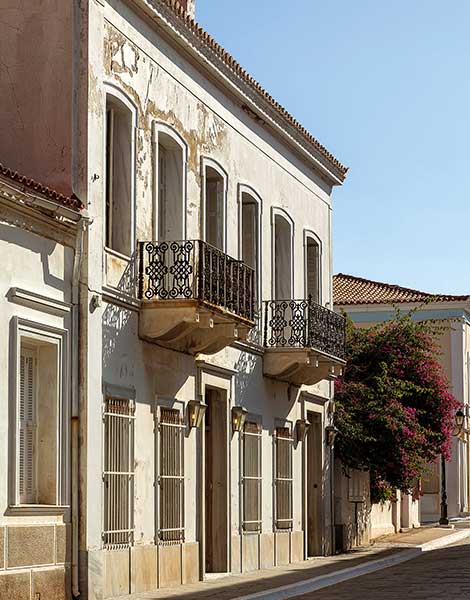
© Perikles Merakos

© Perikles Merakos
Meanwhile, in the ground floor of what was then the Town Hall, feverish preparations were underway. In less than a month would be the official opening of the Kaïreios Library, with its starter collection of books from the library of the orphanage founded by the local philanthropist and educator Theophilos Kaïris for the orphans of the Greek War of Independence. The purpose of the library was to gather and preserve historical documents on the island.
There were also preparations for events at sea. The 20th Andros International Sailing Race which took place on August 26, 1987, starting at Faliro, was particularly gruelling, with Force 8 winds, 6-meter waves and tough competition.
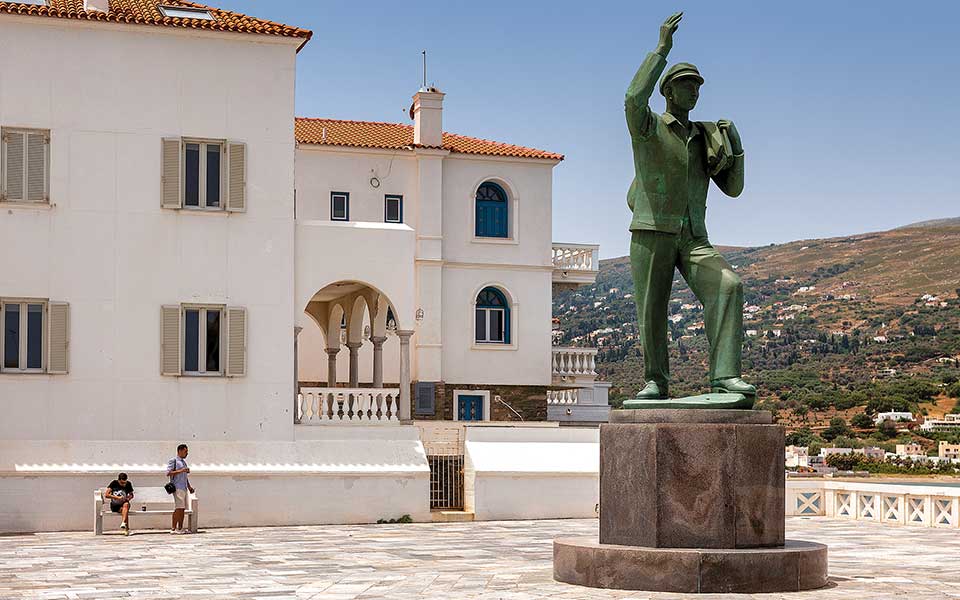
© Perikles Merakos
Now, 34 years after that landmark July, Andros continues to create historic memories. From the Andros International Festival, which takes place every year in August, and the showings of the cinematheque, to the reopening of old trails by the group of 40 volunteers who have undertaken their restoration, the Cycladic island also known as “Hydrousa” after its many freshwater springs has many faces to present and countless experiences to offer.
If architecture is the desire of an era expressed in space, the route which takes you from the ferry port to Chora presents the visitor with all the different historical eras that have passed through the island. The densely built seaside town of Batsi was the first to enter the travel guides in the 1960s, and even more so after 1968 when it featured in the Greek romantic comedy “Girls in the Sun.”
Closer to Chora, on the slopes to the left of the road are the so-called archontochoria (noble villages) – Menites, Lamira, Apikia and Stenes – where the Venetians chose to locate their towers. Along the way, the terraces on the hills testify to a farming past, while entering Chora the architectural references multiply.
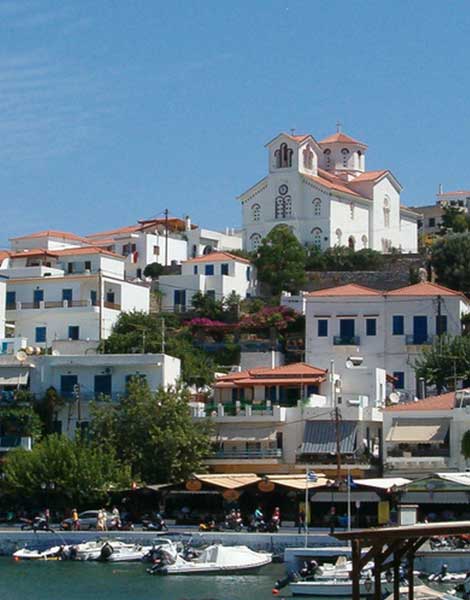
© linmtheu
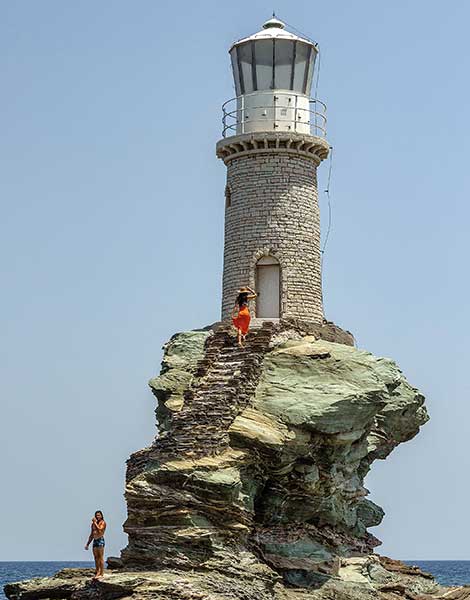
© Perikles Merakos
Chora of the sea captains
The home of shipowners, sea captains and ships’ mechanics, Chora has been shaped by the wealth brought by the sea in the late 19th and early 20th centuries. In 1939, Andros was second only to Piraeus in the number of ships on its registry.
It was an Andros shipowner, Dimitris Moraïtis, who started the shipping line connecting Greece to North America at the beginning of the 20th century. The shipping families of Empirikos and Goulandris were the first to start giving back to their island, while Neoclassical mansions were erected in quick succession. Cosmopolitan and wealthy Andriots embraced all the trends of the age. On the way into Chora, historic mansions jostle with Bauhaus-style buildings dating to the 1930s.
The nickname “Little England” is a somewhat hyperbolic reference to the island’s rich maritime activity. The novel of that name by Ioanna Karystiani, and the film version directed by Pantelis Voulgaris record the realities of life on Andros in the first half of the 20th century.
Andros local Efi Raptaki shows around her family’s mansion which is located near the Museum of Contemporary Art. She remembers life as a child on the island with no men, as all of them were off at sea. Celebrations at her aunts’ female gatherings, dancing and singing when the captains returned. She shows us benches taken from an ocean steamer headed for the breaking yard, and points out the architectural motif known as “sardines” which is typical of the Cycladic islands. Overlapping horizontal lines in the plaster of exterior walls, some say to deflect the rain, and others to cool the homes in summer.
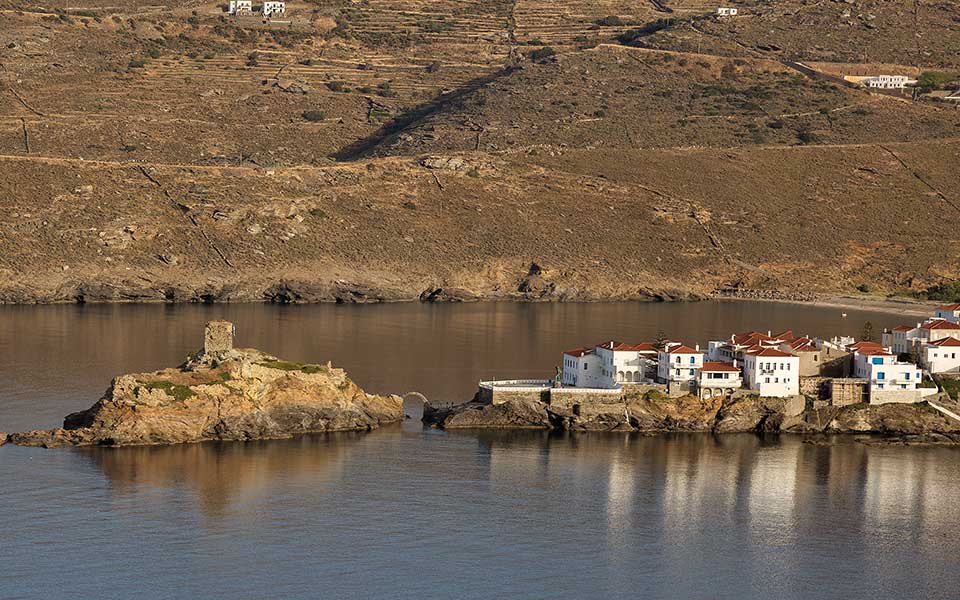
© Perikles Merakos
Chora is built on a peninsula with sea on either side, and no cars are allowed on the tip. The central pedestrian road is where all commerce is concentrated, as well as most of the sights.
The Andros Archaeological Museum was founded in 1981, while two years later had seen the opening of the Museum of Contemporary Art of the Basil and Elise Goulandris Foundation, with the works of local sculptor Michalis Tompros. In 1986 the museum opened a new wing to house significant paintings from the couple’s personal collection, many of which now grace the Foundation’s new museum in Pagrati.
On the main street, greetings between locals fill the air, while you will often hear French spoken – it would appear that the French have a special appreciation for the artistic air and outdoor activities on offer in Andros.
The island tends to be quiet on weekdays. As it is so close to Athens, many visitors come on weekend trips. The same goes for Athenians who have holiday homes on Andros – and there are many of them. This may be the reason why there are few rooms available for rent, but rather a handful of high-quality options. Heading down towards the sea, you will find the Nautical Museum on the square of the Unknown Sailor.
A narrow stretch of sea separates Chora from the tiny island where the Castle is located. They are joined together by a high arch, the Kamara, which I see many daring souls crossing to reach the Venetian fort and get a view of Tourlitis, the impressive lighthouse built in 1887 on a rocky islet.
As noon approaches and the temperature increases, people gather by the Kamara for a quick dip. The calm of the midday swim in interrupted by a buzzing sound, coming from a drone flown by an American tourist who attempted to cross the arch but eventually gave up.
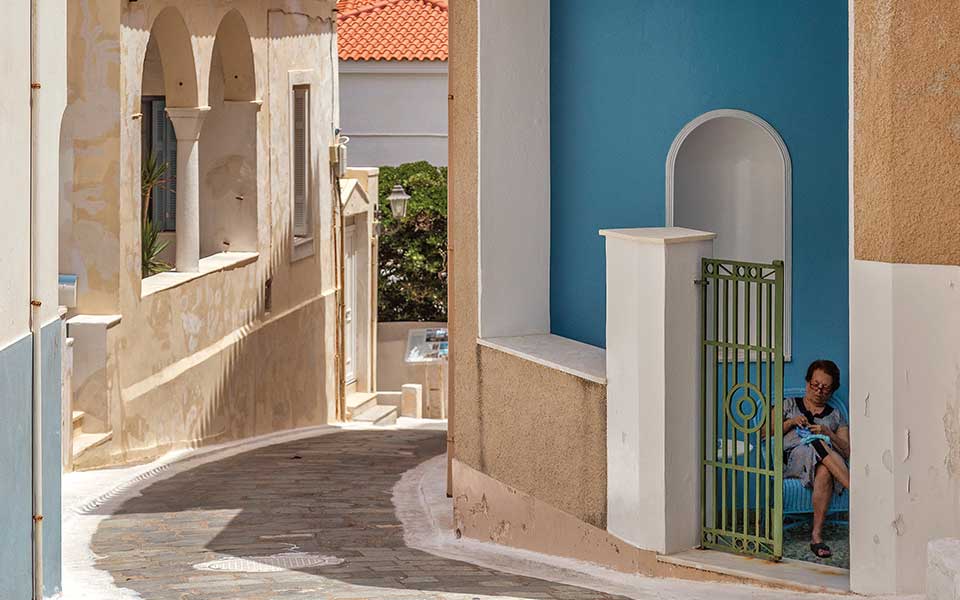
© Perikles Merakos
Water sports and artists
To the left of Chora, almost joined to it, is Niborio, a large bay which is also full of landmarks of the island’s rich history. The left is the Yacht Club, which gathered the younger generation of the established bourgeoisie of the island in 1957. Ten years later, the first Andos rally took place at the initiative of Ioannis P. Goulandris. At the right end stands the abandoned Triton Hotel, the old Andros Xenia, which was built in 1958 by the leading architect Aris Konstantinidis. Its clean modern lines contrast with the ornate townhouses of Chora, expressing the progressive spirit of the era.
This was the time when Andros experienced the age of innocence, the carefree Greek summer when the international jet set followed days of art exhibits and rallies with parties until dawn in the Yacht Club, and yachts filled the bay of Niborio.
All of this happened off the radar of mass tourism, it was only in Batsi and Gavrio that tourist businesses begun to sprout. The western side of Andros, in Chora, Korthi and the surrounding villages, were never touched by “Rooms to Let” signs or “traditional” tourist tavernas.
This continues to be the case today. The islanders’ relative wealth from shipping and seafaring kept many of the evils of large-scale tourist development at bay. Most beaches, aside from being large, are not taken up with umbrellas, deck chairs and beach bars. This means that even at the height of the summer season you can find a quiet, uncrowded beach. It also means that the islanders and those who do business there will not need to reverse years of haphazard development, but only need to ensure that Andros continues to develop sustainably in order to protect its character.
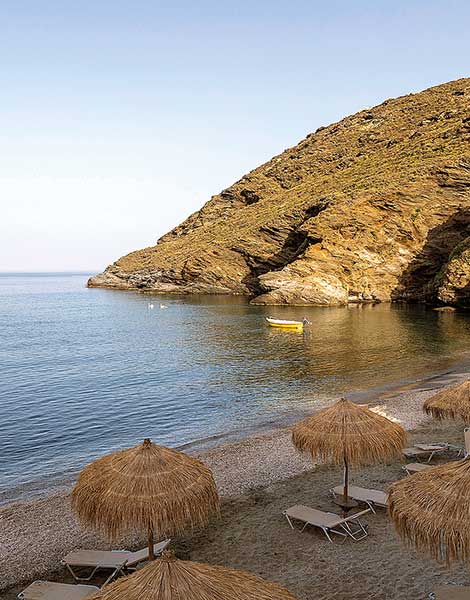
© Perikles Merakos
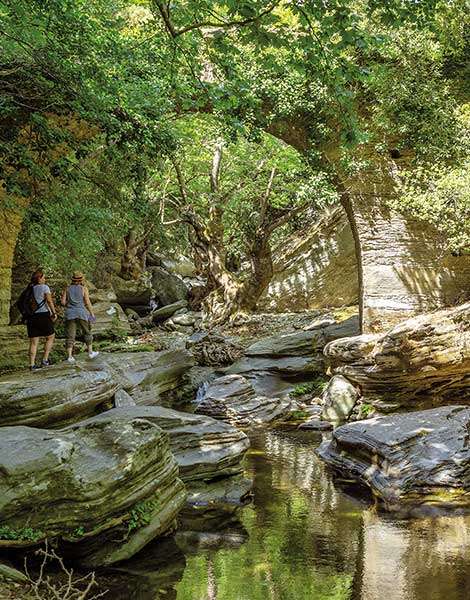
© Perikles Merakos
Trails and waterfalls
The character of Andros is not limited to its seafaring tradition, art or architecture – there is also its natural wealth, whose protection is part of the island’s cultural identity. This is the task of the 40 or so volunteers of Andros Routes, the association which has revived the network of trails across the island, which total around 200 kilometers in length. The association’s coordinator, Olga Karagianni, had the original idea of clearing, marking and certifying the old trails which connected the villages before the paved roads were built.
The volunteers are assisted by locals and visitors, who Olga refers to tenderly as “route angels.” Each has responsibility for specific trails, which they have to inspect five times a year. One of these, Giannis Tridimas, takes us to a trail over the back of Zorkos, and we have trouble keeping up with him up the small hill under the hot sun. A former Professor of Mechanical Engineering at the University of Liverpool, he returned to the island and can be credited with reopening many of the trails on the north side of Andros. He is 76 years old, but his medals and records for trail running help make the climb look like child’s play.

© Perikles Merakos
At the center of the island is where most of the vegetation is concentrated. Creeks, year-round streams, waterfalls and arched bridges – it seems unbelievable, but we are in Cyclades. Andros is easily the greenest of the Cycladic islands. In the village of Menites, you hardly ever feel the heat, while the twenty-minute hike to the waterfalls of Pythara in the village of Apikia takes you through dense trees alongside a stream. A slightly longer walk will take you to the fairy-tale arch of Ahla, some way above the beach of the same name.
On Andros, in addition to oaks, plane trees and walnut trees, you will see many cypress trees. Island lore has it that every time a girl was born, the father planted a cypress tree to have long timbers to build her a house. Others claim that the straight trunk of the cypress is ideal for a mast, while most agree that the trees make ideal windbreaks on an island which is whipped by high winds for most of the year.
On Kaïri square, the most central location in Chora, it has already started to blow. French tourists hang onto their hats as they climb the steps to the Museum of Contemporary Art, while behind them you can see the boats setting sail from Niborio. In a few hours it will be dark and the wind will cool off. Nobody knows whether this summer will be one for the history books on Andros like the glorious 1987, but everyone hopes it will be carefree. It will certainly be full of art and full of sea.
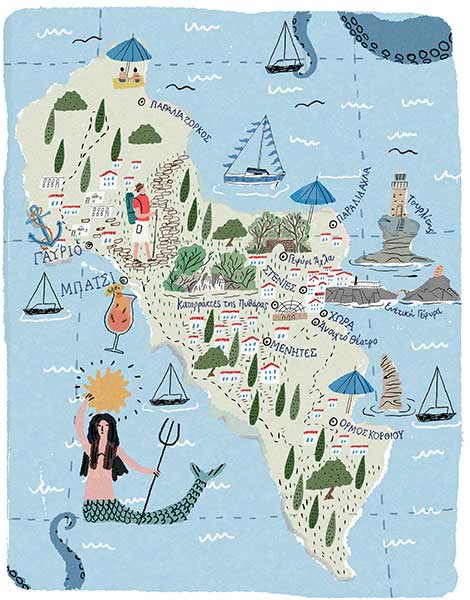
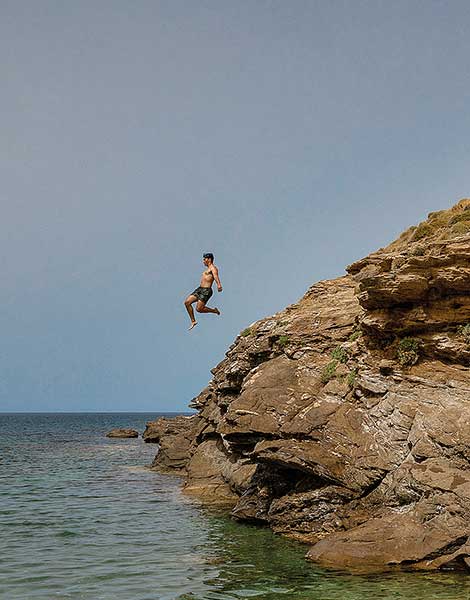
© Perikles Merakos
Getting there
You can get to Andros by sea from Rafina (2 hours, 19.50 euros one way). The route is served by Golden Star Ferries (Tel. (+30) 212.222.4000) and Fast Ferries (Tel. (+30) 210.4182.005).
Accommodation
Micra Anglia (Chora, Tel. (+30) 22820.22207, from 170 for a double room with breakfast). The rooms and suites of this boutique hotel set in a great location in Chora with a view of Niborio exude the cosmopolitan air of the early 20th century.
Nicolas (Korthi bay, Tel. (+30) 22820.61595, from 70 euros for a double room with breakfast). Built in an amphitheatrical setting overlooking the bay of Korthi, the hotel boasts minimalist modern rooms, suites and apartments with a sea view.
Votsalo Seaside (Gyalia beach, Tel. (+30) 6944.510.198, from 300 euros a house). The three two-storey houses are located right on the beach, surrounded by gardens with organic produce, shady trees and space to enjoy coffee and drinks. All houses have king size beds, smart TV, a fully equipped kitchen and a jacuzzi.
Anemomiloi (Chora, Tel. (+30) 22820.29067, from 110 euros for a double room with breakfast). Double rooms, suites and apartments, a swimming pool and a good breakfast in an ideal location in Chora.
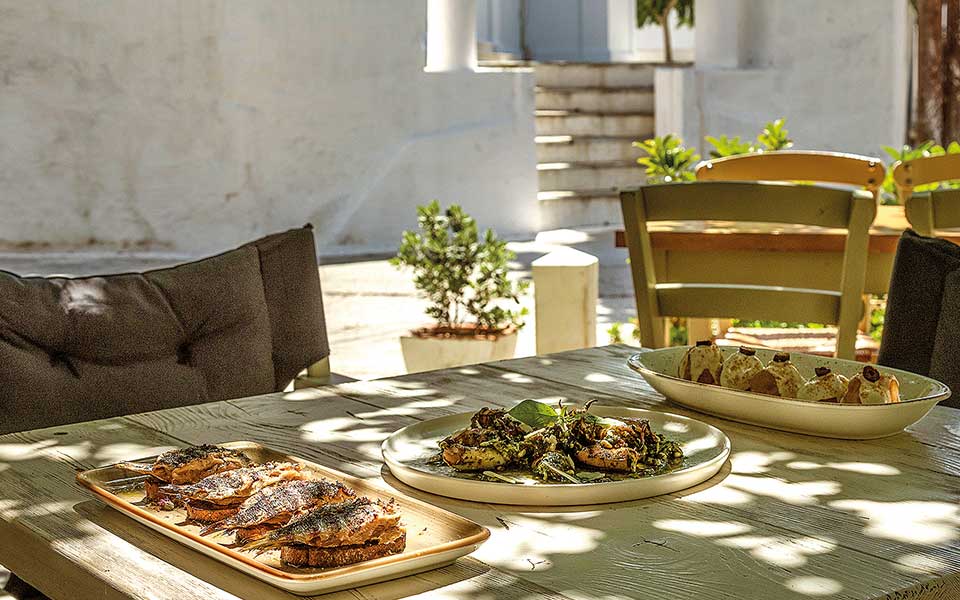
© Perikles Merakos
Food
Skalakia (Chora, Tel. (+30) 22820.22822). The best interpretation of local cuisine, with delicious fourtalia (the local frittata) with sausage, handmade dolmadakia (stuffed vine leaves), and Greek salad with soft Andros cheese.
Sea Satin Nino (Korthi Bay, Tel. (+30) 22820.61196). Grilled sardines with caramelized onion, calamari with basil pesto, roasted cherry tomatoes and Andros volaki cheese with a drizzle of pesto a la Caprese: tasty, imaginative dishes on a menu designed by Maria Tiniakou and executed with her husband, chef Dimitris Giginis.
Endochora (Chora, Tel. (+30) 22820.23207). The menu is short and well-executed, from seafood pasta and mushroom orzo to smoked pork chop and rich green salads.
To Steki tou Andrea (Fellos Beach, Tel. (+30) 22820.72070). In a cool courtyard close to the beach, you will taste homemade melitzanosalata (roast aubergine dip), pies with handmade filo crust and local meat.
Kossis (Ano Fellos, Tel. (+30) 6972.002.975). Its reputation will bring you here, almost in the middle of nowhere, on the road to Zorkos beach. The ribs are a must, as is the roast kid goat and the liver.
Drinks & coffee
Verde (Chora, Tel. (+30) 22820.27403). Under the mulberry trees, you will appreciate the gentle breeze and the good coffee. Also serves brunch, breakfast, a short food menu, and drinks and cocktails in the evening.
Ermis (Chora, Tel. (+30) 22820.22233). A meeting point for locals and visitors in the most central location in Chora on Kaïri square. Here you will sample fresh nougatina, Andros’s trademark sweet.
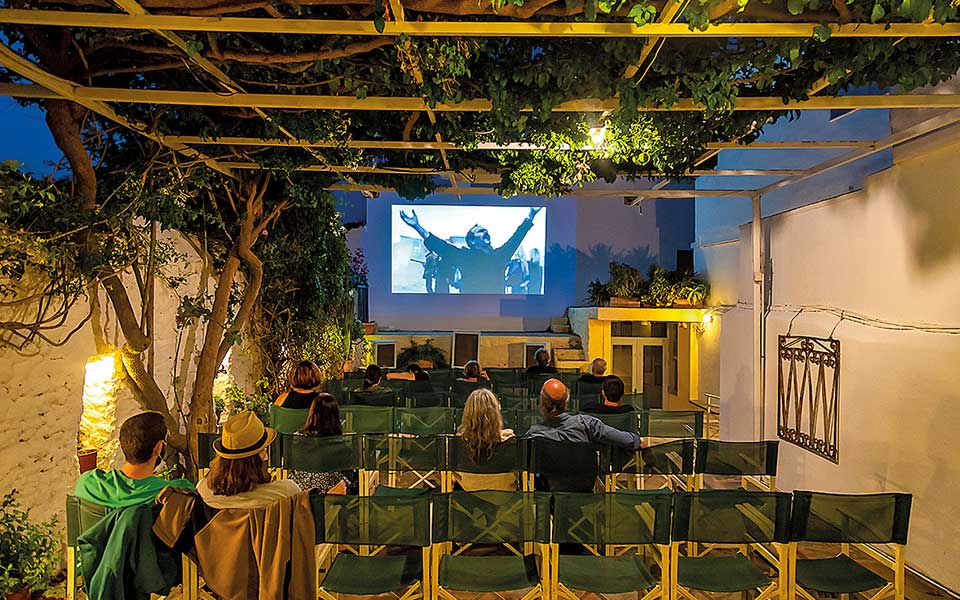
© Perikles Merakos
Shopping
Waikiki (Chora, Tel. (+30) 22820.23685). Simple, doric-style dresses, small works of art, many of which are designed by the boutique owner herself.
Beaches
From Zorko and Vitali in the north to Ahla and Gyalia in the east, Andros is full of long sandy beaches with blue, crystal-clear waters. Also note the famous Tis Grias to Pidima, Syneti and Paraporti, which is right next to Chora. Almost no beaches are organised, so come equipped with the necessities (umbrella, water, etc.). Michalis Stamatis (Tel. (+30) 6944.215.893) operates a boat for day trips around the island, fishing, and swimming.
Summer agenda
At the Museum of Contemporary Art you can see a retrospective of the painter Giorgos Rorris’s work entitled “The Nobleness of Purity”, until 3 October, goulandris.gr.
Visit the Petros and Marika Kydoneos Foundation for the exhibition “Ploes 27” from 31 July to 3 October, Tel. (+30) 22820.24598.
The Kaïreios Library presents the exhibition “Theophilos Kaïris, fighter and politician”, until 26 September, kaireios.gr.
The Open Theatre in Chora hosts the Andros International Festival, from 1-28 August, festivalandros.gr
The Andros cinematheque organizes three film showings a week at the Municipal Theatre’s Cine Avli. For a programme visit androsfilm.gr.
On 25 and 26 September, the 5th Andros Trail Race will feature 5, 10 and 24 km races. For more information, visit androstrailrace.gr
We are grateful to the Basil and Elise Goulandris Foundation and the Foundation’s Director, Kyriakos Koutsomalis, for their help in writing this article.

